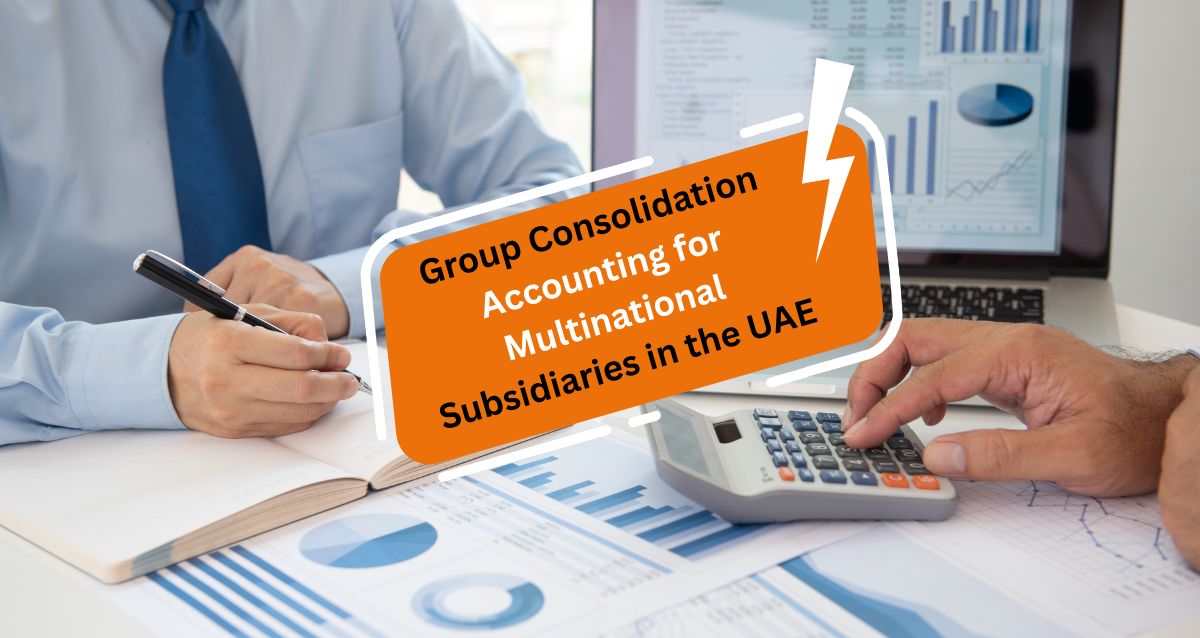UAE Guide to Group Consolidation for Multinationals
As multinational entities are continually expanding their business operations in the UAE through branches, Permanent Establishments and subsidiaries. There is an increasing pressure from global headquarters, investors and various regulatory authorities to maintain transparent, accurate, and compliant financial statements.
One critical area that gets ignored is group consolidation accounting. And this is happening especially for UAE-based subsidiaries, branches, and related entities while preparing their financial statements. It is very crucial to prepare and maintain the financial statements as per International Financial Reporting Standards (IFRS), irrespective of whether you are managing multiple businesses under a single head office or operating a corporate structure that spreads across several countries.
This blog gives you an idea of the best practices, local considerations, and key challenges in group financial consolidation for entities having a UAE presence.
What is Group Consolidation Accounting?
Group consolidation accounting refers to the process of combining the financial statements of a parent company and its subsidiaries into a single, unified financial report. This includes:
- Removing transactions between inter-company
- Consolidation of assets, Liabilities, Revenue and Expenses
- Representation of Non - Non-Controlling Interests
- Adjusting and reporting fluctuations with different currencies

In the UAE, the preparation and maintenance of financial statements as per International Financial Reporting Standards (IFRS), are mandatory for most entities, particularly those governed by:
- Free Zone authorities (e.g., DIFC, ADGM, DMCC)
- Mainland DED-licensed businesses
- Entities listed on DFM or ADX
- Financial services companies and auditors
Why Group Consolidation is Essential for Global Firms
Multinational Corporations are using their branches, subsidiaries or related entities in the UAE for various strategic purposes:
- Holding international assets
- Managing local or international cash flows
- Incorporating revenues in low tax jurisdictions
- Tax optimisation through Free Zones or holding companies
Without accurate group consolidation as per IFRS, the financial statements may result in:
- Misrepresenting operational performance
- Undervaluing liabilities
- Misguide investors, lenders, or board members
- Causes non-compliance with financial institutions or audit bodies
Key Challenges in UAE-Based Group Consolidation
|
Challenges |
Solution |
|
Multiple Jurisdictions and currencies – Headquarters, Subsidiaries, branches, and related entities may operate in different currencies (AED, USD, EUR, INR) and jurisdictions with different reporting timelines.
|
Use multi-currency accounting software like Zoho that can manage Currency transaction adjustments and reconciliation of exchange rates for an efficient Financial reporting process. |
|
Inter-company Transactions – Elimination of Revenue, expense, Liabilities or asset transactions between the UAE and its foreign subsidiaries is a must during the consolidation of financial statements. |
Maintain a standardised inter-company invoicing procedure with real-time reconciliations. |
|
Variable Chart of Accounts – Different subsidiaries or related entities may use separate accounting standards or COAs |
Maintain a standardised organisation-wide Chart of Accounts and implement unified closing processes. |
|
Varying VAT Treatments – There will be a difficulty while making intra-company cost allocations, if UAE subsidiaries are VAT-registered and filing returns with the authority promptly, while offshore entities may not be. |
Use a tax-efficient ERP system or accounting software for preparing the financial reports. Also, seek expert advice and review during the consolidation process. |
|
Timing Differences and Manual Errors – Manual entries and timing mismatch across UAE subsidiaries and offshore entities lead to consolidation errors |
Systemise monthly/quarterly consolidations and use checklists for closing cycles. |
Best Practices for Group Consolidation in the UAE

To achieve accurate and compliant consolidation, multinational entities should:
- Apply IFRS 10 (Consolidated Financial Statements) while preparing the financial reports.
- Manage monthly inter-company reconciliations
- Use cloud-based accounting software with built-in consolidation features (e.g., NetSuite, Xero, Zoho Books)
- Conduct an internal audit and implement group accounting controls
- Engage with UAE-based accounting firms experienced in international consolidation and IFRS audits
How Flyingcolour Tax Consultants LLC Can Help?
- Ensure compliance with UAE-specific requirements and International Financial Reporting Standards (IFRS)
- Structuring and setting up the Consolidation Process
- Advising on tax planning and compliance related to group consolidation, including transfer pricing, VAT implications, and corporate tax structuring within the UAE
- Assistance with Audit Preparation
- Regulatory Filings and Reporting
Conclusion
As your multinational structure grows, the complexity of group-level financial reporting increases. Whether you're operating through UAE Free Zones, mainland companies, or offshore, financial accuracy, consistency, and compliance are mandatory.
With the right accounting practices, systems, and expert support, you can present a clear and powerful financial picture to your investors and global regulators.
To learn more about Group Consolidation Accounting for Multinational Subsidiaries in the UAE, book a free consultation with one of the Flyingcolour team advisors.
Disclaimer: The information provided in this blog is based on our understanding of current tax laws and regulations. It is intended for general informational purposes only and does not constitute professional tax advice, consultation, or representation. The author and publisher are not responsible for any errors or omissions, or for any actions taken based on the information contained in this blog.


